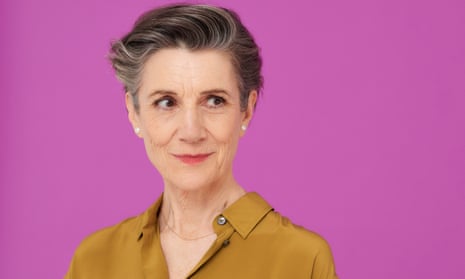Our drinks have not arrived – hell, we’ve not even seen a menu – and the great Dame Harriet Walter already appears to be having something of an existential wobble. By way of familiarising ourselves, I’d lobbed her a softball question about how she is coping with life and work during Covid. But I’ll quickly learn that Walter, the 71-year-old actress, royalty of British theatre, a Dame since 2011, prefers searing honesty and eviscerating self-awareness to small talk.
“I’ve become very confused about what I think,” she admits, as we settle in for lunch at a bougie brasserie in Chiswick, west London. “The trajectory one thought life was going on and why I was here and what good I was in the world suddenly went splat. A lot of things I was keeping at bay, like a sense of being a bit irrelevant, have come in on me.”
That Walter hasn’t been sick herself during the pandemic and has worked steadily only reinforces her guilt. “It’s fairly typical that I’ve avoided the illness,” she says. “I just feel I’m a privileged white woman of a certain age and therefore the major concerns and the major things that need changing in the world are not part of my experience. I can’t feed in and be helpful, except to be supportive in little ways.” She stops and sighs, “I’m talking to you like you’re a shrink!”
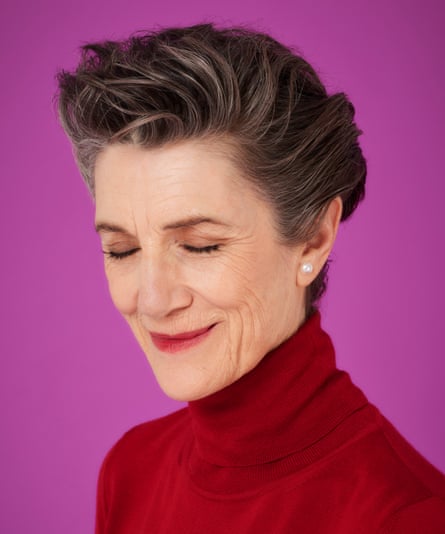
What’s strange about this assessment is that the reason we’re sitting here is that, for a younger, streaming-savvy demographic, Walter has never been more relevant. For most of her career, which now spans more than half a century, she has been best-known as a peerless performer on stage. She has played many of Shakespeare’s major female characters – and thanks to the Donmar Warehouse’s all-women productions in the 2010s – some of the men, too. When Walter has appeared on screen, it has often been in period pieces, such as Ang Lee’s Sense and Sensibility in 1995, or as Lady Shackleton in Downton Abbey.
In recent years, though, Walter has started turning up in all sorts of surprising places, including several of the best shows in a golden age of TV. In Killing Eve, she was Dasha, the Russian former Olympic gymnast and KGB operative with a predilection for leopard print who mentored Villanelle (Jodie Comer). In Succession, she is Lady Caroline Collingwood, the stony-hearted British mother of the younger Roy children and second wife of Logan (Brian Cox), a woman who, even in a series defined by the contemptible behaviour of its principals, manages to stand out. Walter popped up again in the second series of Ted Lasso on Apple TV+, the comedy drama following an American coach who takes over an English football team, which recently cleaned up at the Emmy awards. There have also been smaller roles in Patrick Melrose, Doctor Who and soon we will see her as the mother of the Adam Kay character (played by Ben Whishaw) in the BBC’s keenly awaited adaptation of Kay’s bestselling NHS memoir This is Going to Hurt.
In short, it’s been quite some run. And that’s before noting that Walter is in Ridley Scott’s latest film, The Last Duel, written by Matt Damon and Ben Affleck. “Irrelevant” seems a stretch, I suggest; in fact, it feels like the opposite. “Yes, I think that’s true as well,” Walter concedes. “So as I say, I’m confused. And I wouldn’t want this to come over as a moan. It’s the very opposite of a moan.”
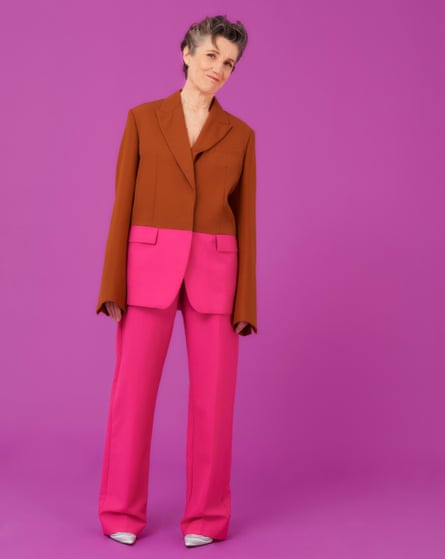
Walter gives some credit for the change in direction to engaging new agents four years ago. (She’s now with Hamilton Hodell, whose roster includes Whishaw, Tom Hiddleston and Vanessa Kirby.) “I think, before, I was put in the serious actress box, the classical actress box and therefore the idea I’d want to go around killing people with a Russian accent didn’t fit into it. I’m not being overly modest. I know I can do it, but what I mean is, it’s not ever been about just being good at it. It’s always been about being able to put yourself out there. That’s where I’ve not been very good. There are people who can play the game way better than me. And that’s why I should have got stronger agents earlier, because they play the game for you.”
Leading roles are hard to come by at Walter’s age, she’s pragmatic enough to accept that, but she has become a highly effective scene-stealer. She’s particularly in demand as the mother of the main character; with her high cheekbones and clipped, precise intonation, she can switch from meek to menacing in a finger-click. “People always say, certainly for drama, you’ve got to have opposition, haven’t you?” she says. “You can’t have someone saying, ‘Yes, I agree, darling. You’re lovely, darling.’ So sometimes they are the more fruity parts to play, because there’s more conflict. But sometimes I fear I’m reinforcing a negative image of older women.”
Walter takes a sip of Coke with lime and smiles mischievously: “And I’m living proof that we’re sweet and cuddly!”
Privilege has been a recurring preoccupation for Walter. She was born not far from where we’re having lunch and grew up, she writes in her 1999 book about acting, Other People’s Shoes, in “uneventful comfort” in the 1950s. One of her ancestors, John Walter, founded the Times newspaper in 1785.
It was another relative, her uncle, the celebrated archvillain and horror star Christopher Lee, who one might assume to have influenced her choice of profession. Walter, though, doesn’t connect Lee with her decision to pursue acting. “No, it wasn’t really that,” she says. “I think what that did was it meant that my family didn’t think I was completely crazy. My uncle would come over from Hollywood quite a bit and we did go and see him on the sets of the Hammer horror films, but I don’t think I put two and two together and thought, ‘This is what I’m trying to do.’ I don’t quite know why I didn’t, but it didn’t seem to be the same thing. And the sets were made of papier-mâché or whatever, it wasn’t a real house, so that was a bit upsetting.”
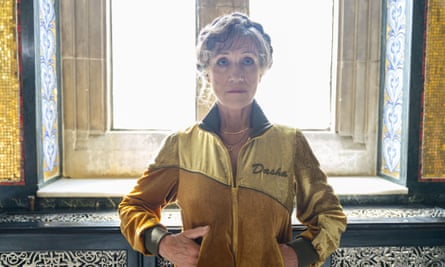
Walter turned down a place at Oxford, accepted one at Lamda drama school, and threw herself into agitprop and political theatre. In Other People’s Shoes, she tells a story of how, one winter’s night, she slept rough on a bench to see what it felt like. “The trouble was that I could not recreate the conditions of someone forced to spend the night on a park bench not just for the night, but for unknowable numbers of nights to come,” she conceded.
Theatre was everything for Walter back then; she didn’t take a role in TV or film until she was almost 30. “Perhaps a regret is that I’ve never done anything as focused or intense on screen as I’ve done on stage,” she says today now. “I haven’t really done what I would feel, ‘Oh, that’s a really fantastic performance. I’m really proud of that.’”
Why is that? “It’s just a fact: I didn’t have the youthful beauty that does help in a film career,” she says. “Let’s face it, there is a very above-average percentage of beautiful people who star in films. It’s a medium that loves beauty. And I didn’t have that beauty. I don’t mean I was horrible-looking, I just didn’t have that camera-friendly perfection that is easy on the eye and draws people in.”

Walter agrees that older faces can be “interesting”, more characterful. “I do, I just don’t like my own older face,” she says. “If I watch myself on screen, I just see the lines. And I would say the same if I’d had loads of facelifts. That’s interfering with your face as well. It’s just that youth has that purity, that it-could-go-anywhere sense the camera loves.”
It is an unsparing judgment, but one that Walter believes all actors have to make at some point. “Just in case anyone thinks it’s been a totally smooth ride, I have definitely had a lot of rejection,” she says. “Things like, I wasn’t a big enough name to do a West End transfer, or somebody else got a job because they were a bigger name. Quite hurtful things, because you’re not rejecting a pair of shoes I designed, you’re rejecting me. Luckily, you forget, partly just as a product of living a long time, I think. You can’t keep those grudges in your heart for that long.”
There is certainly something slightly backwards in the fact that Walter should get her biggest film break in her 70s then, thanks to Ridley Scott’s The Last Duel. “It’s very much a big deal, because I haven’t done mega movies,” she says, picking the protein out of a huge bowl of tuna Niçoise. “I’ve done some independent films, I’ve done some films that became well known, but nothing on this scale.” Walter did though appear as a doctor, Kalonia, who patches up Chewbacca in the 2015 film, Star Wars: The Force Awakens. “I did seven seconds,” she says, “I counted them.”
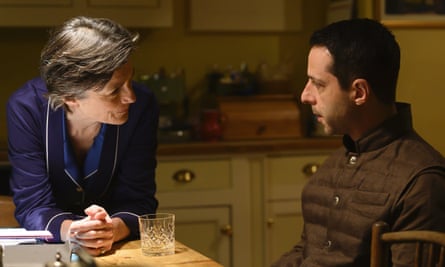
The Last Duel tells the true-ish story of a feud between two noblemen, Jean de Carrouges (Matt Damon) and Jacques Le Gris (Adam Driver), in 14th-century France. When de Carrouges’s wife Marguerite de Thibouville (Jodie Comer) claims that Le Gris has raped her, the pair agree to fight to the death. Walter plays Nicole de Buchard, de Carrouges’s mother – and yes, another frosty, duplicitous older woman.
“It’s basically a feminist film, which is probably going to be thought of as contradictory,” she says. “It’s in three parts from three different points of view and it’s very clear that the woman’s point of view is the one that we are to believe. I’m very much there as a difficulty that’s put in the path of the young woman. And Jodie’s character valiantly tries to hold her own against that. You think, ‘Oh, it can’t be relevant, it’s hundreds of years ago.’ But unfortunately what it does show up is the roots of why these attitudes prevail now.”
Also this month, Succession returns on Sky Atlantic and we will come to learn the new, always innovative ways in which the Roy family – a super-rich media dynasty in the vein of the Murdochs, the Maxwells and the Redstones – will aggrandise and humiliate themselves. When Walter was offered the part, Jesse Armstrong, the creator of the series, told her that one of the inspirations for her character was the writer Lady Caroline Blackwood, a celebrated wit and aristocrat whose husbands included artist Lucian Freud and poet Robert Lowell. With Succession now in its third series, Walter notes that it is easy to dismiss her Caroline as “an awful mother”, but she tries to find ways to subtly humanise her.
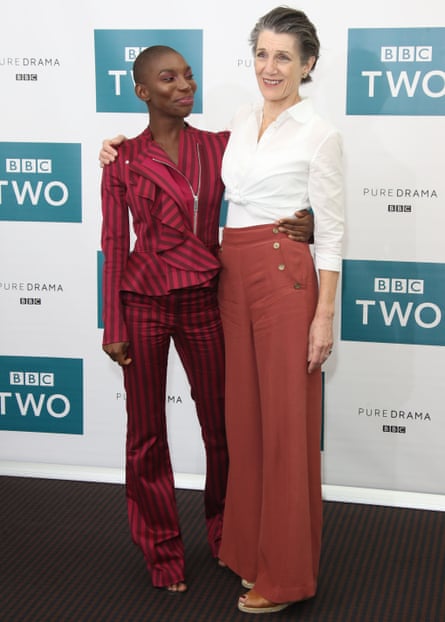
“All her jokes and lightweight nastiness are self-defence, I think,” she explains. “I’m not whitewashing her, she’s not a human being I would want to befriend, but she’s not a wicked monster of the North. And that’s why Jesse is this sort of genius. You do care about these characters in some weird way. And they do stay with you as human beings, even though you can’t quite understand why.”
Walter clearly gets a thrill from dipping in and out of shows such as Succession, Killing Eve and Ted Lasso. “In a way I wish I’d been asked to do this amount of variety when I was younger,” she says. “It’s such fun to play one thing one minute and another the next. And I’m having a ball. So I hope Mrs Succession goes on being horrible for another few years.”
In between jobs, Walter doesn’t stray far from home. She’s married to the American actor Guy Paul, whom she met in 2009 when they were both in Friedrich Schiller’s Mary Stuart on Broadway. In her downtime, she plays piano and brushes up her Russian on the Duolingo app. She was pleasantly surprised that she and Paul didn’t drive each other mad during the pandemic. “We’ve been separated quite a lot by our work,” she says, “so it’s good to find we don’tcompletely tear one another apart when we’re left alone.”
Walter describes herself variously as “a retreating gregarious person… a cautious extrovert… a socialised narcissist”. Even though lockdown is over, for now, she and Paul are unlikely to be throwing big parties. “I’m not an entertainer, in the sense of, ‘Come round to our place, there’s always something on the hob!’” she says. “I’m very much not that person. I’m more shut the door and hide. Home is for running away.”
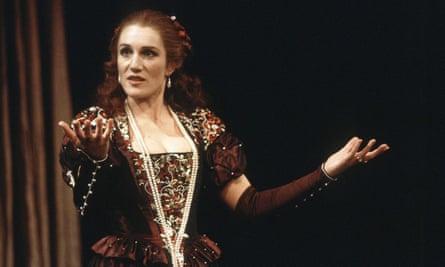
Sometimes, Walter says, she wonders why she’s still working as hard as she is. Why she hasn’t retired to a nice house in the south of France. But then she realises that she still has ambitions as an actor. She would like to act more with female directors, specifically Phyllida Lloyd and Joanna Hogg. She feels she could be more proactive about collaborating on projects, rather thanpassively waiting for them to come to her.
“I’ve thought about giving up acting occasionally, because a lot of it is stressful and silly,” she says. “But we all like to do things we know we’re good at and that people want us to do. It’s reaffirming, it makes you feel useful. I may not like the results always – in fact seldom – but I know how to actually do it.”
Walter, having made a modest dent in her salad, stands up to leave. A couple of hours ago, when she arrived, she worried she might be “irrelevant”, but she seems to know deep down that acting is something she can do – and do rather well. And thanks to her roles in surprising, zeitgeisty shows, a new audience is realising that, too. As amateur shrink appointments go, it’s been a success. “I’m very bad at cooking, I’m very bad at business,” she says. “So I’ve found the thing that I can do for a living, and that’s very, very fortunate. And it also is something that you happen to be able to do until you drop dead, so there are a lot of great things about it.”
The Last Duel is in cinemas from 15 October
Fashion by Hope Lawrie; hair by Alex Szabo at Carol Hayes Management using Rita Hazan hair products; makeup by Kelly Cornwell at NYLON Artists using Jones Road; shot at Jet studio
